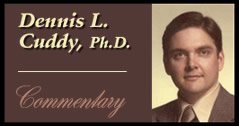Other
Cuddy
Articles:
Sept. 11:
Hold Government
Accountable
An
Economic Assault on
African-Americans and Others in The US
SEPT. 11 PROBE MUST CONSIDER FLAWED AIR DEFENSES
By Dennis L. Cuddy, Ph.D.
June 15, 2004
NewsWithViews.com
The New York Times on April 25 published Philip Shenon's "9/11 Panel Set to Detail Flaws in Air Defenses." And the Sept. 11 Commission will soon hold one of its final hearings on this subject. The commission has received testimony that it was clear to the Bush administration from the Aug. 6, 2001, presidential daily briefing that there was the possibility of a terrorist attack in the United States.
Administration officials have acknowledged this fact, but have consistently said they had no information that hijacked planes would be used as missiles to crash into the World Trade Center and Pentagon. They apparently still do not realize that this is irrelevant, and it could cost more American lives in the future.
Here is what common sense should have told them: Since terrorists had already attacked the World Trade Center in 1993, they might try again. If so, how could such an attack by land (e.g., truck bomb) or by air be prevented?
Whether an air attack was by hijacked airliners or Lear jets packed with C-4 explosives or small planes or helicopters with machine guns or shoulder-launched rockets, the obvious response would be to have a military helicopter, such as an Apache Longbow, on standby alert at a military installation in the New York City area.
Former head of counterterrorism Richard Clarke, who testified before the Sept. 11 Commission, related that helicopters had been part of their plans to prevent attacks upon the Atlanta Olympic Stadium in 1996 and five or six other events between 1996 and 2001.
Not only could the attack upon New York City have been prevented, but so too could the attack upon the Pentagon if a military helicopter had been on standby alert there. When Vice President Dick Cheney was in his bunker after the twin towers were hit, an aide came to him and said the hijacked airliner heading toward Washington was 50 miles out, then 30 miles, then 10.
Whenever a Sept. 11 commissioner on April 8 asked National Security Adviser Condoleezza Rice about whether the attacks of Sept. 11, 2001, could have been prevented, or about the Aug. 6, 2001 presidential briefing titled "Bin Laden Determined to Attack Inside the United States," she replied there were no specific warnings regarding the date, location or method of attack the terrorists would use.
It's almost as bad as saying the view of the Bush administration is that unless Osama bin Laden calls the White House and says next Tuesday he will attack a specific building in your hometown with a truck bomb, there is nothing they can do.
Ever since Sept. 11, I have been raising questions like the one above, but the Sept. 11 Commission thus far has not addressed them adequately. In fact, when Rice testified before the commission on April 8, not only did no commissioner ask her about preventive contingency planning for attacks upon the World Trade Center and Pentagon, but they also did not ask who called San Francisco Mayor Willie Brown late at night on Sept. 10, 2001, warning him and all Americans about air travel (he was supposed to fly to New York City on the morning of Sept. 11).
Nor did any commissioner ask Rice who the top Pentagon officials were who on Sept. 10, 2001 suddenly canceled their travel plans for the morning of Sept. 11, apparently because of security concerns.
In an effort to find out if there were any warnings relevant to the attacks of Sept. 11, I filed a Freedom of Information request with the federal government. The Department of Homeland Security replied that they found 12 relevant "Information Circulars" of 35 pages, but they would not let me see them. I informed the Sept. 11 Commission of this, but they have not responded, either, and it is therefore doubtful it will issue a report satisfactory to the American people.
� 2004 Dennis Cuddy - All Rights Reserved
Dennis Laurence Cuddy, historian and political analyst, received a Ph.D. from the University of North Carolina at Chapel Hill (major in American History, minor in political science). Dr. Cuddy has taught at the university level, has been a political and economic risk analyst for an international consulting firm, and has been a Senior Associate with the U.S. Department of Education.
Cuddy has also testified before members of Congress
on behalf of the U.S. Department of Justice. Dr. Cuddy has authored or
edited seventeen books and booklets, and has written hundreds of articles
appearing in newspapers around the nation, including The Washington Post,
Los Angeles Times and USA Today. He has been a guest on numerous radio
talk shows in various parts of the country, such as ABC Radio in New York
City, and he has also been a guest on the national television programs
USA Today and CBS's Nightwatch.
"Not only could the attack upon New York City have been prevented, but so too could the attack upon the Pentagon if a military helicopter had been on standby alert there. When Vice President Dick Cheney was in his bunker..."







